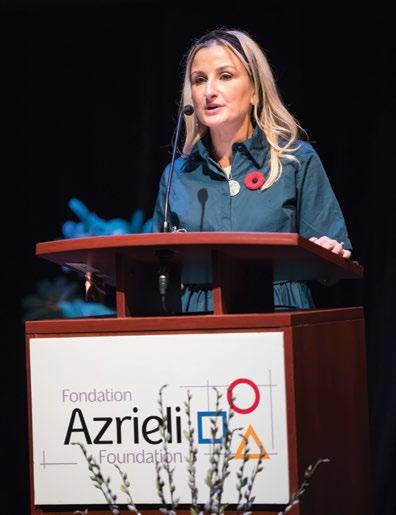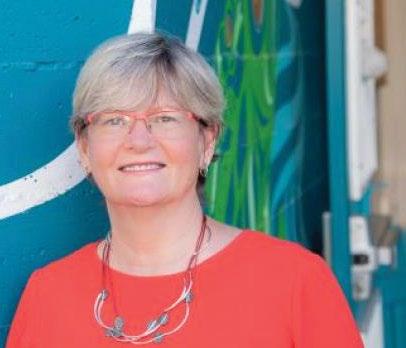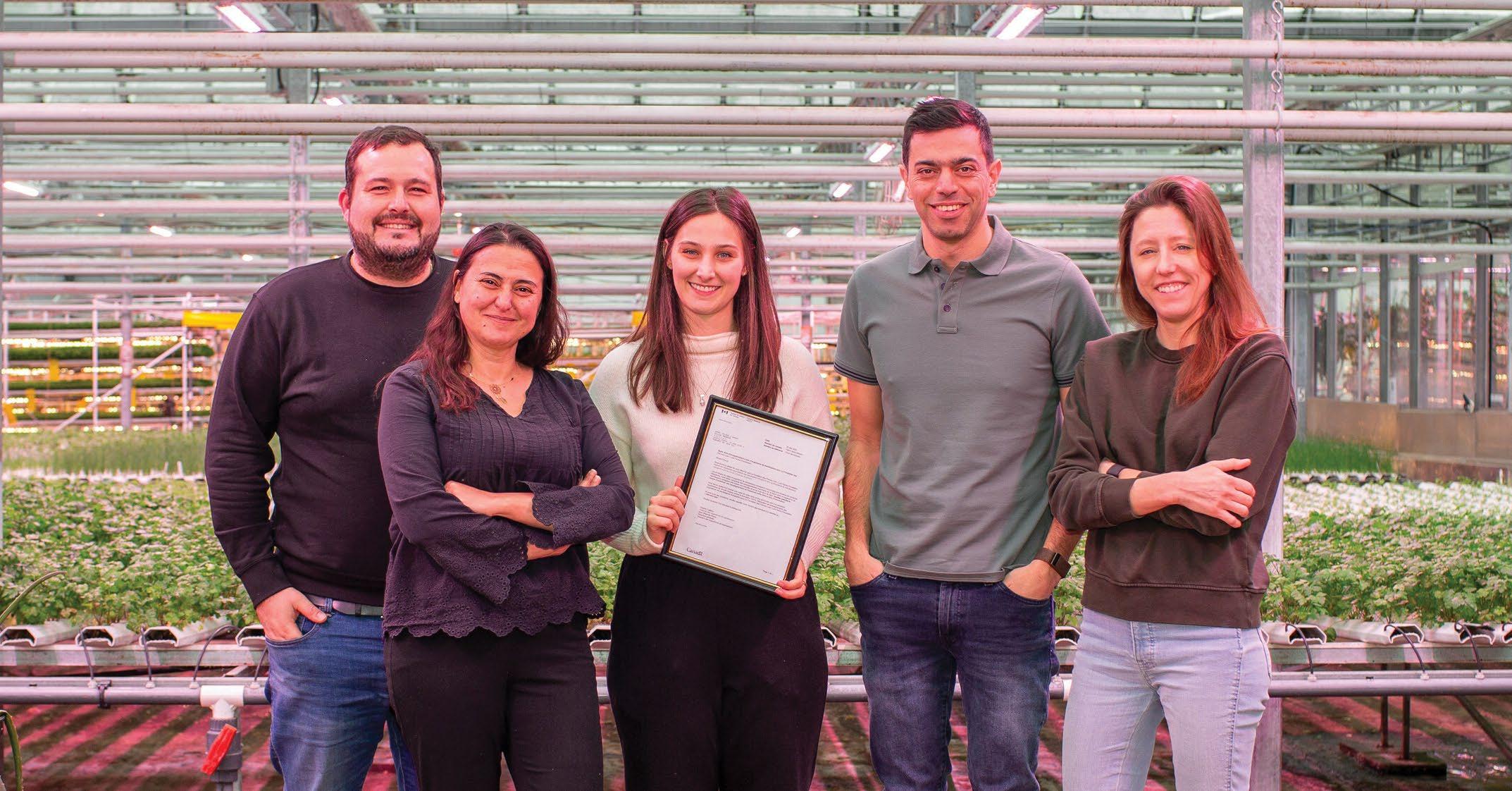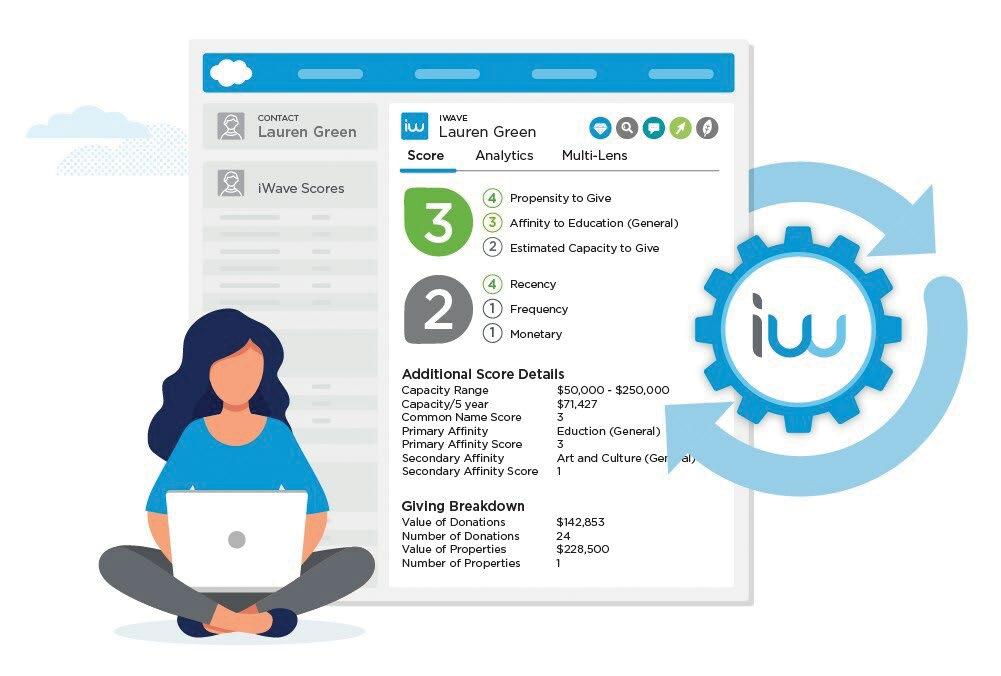
10 minute read
CONTENTS
January/February 2023 | Vol. 4 | No. 18 www.foundationmag.ca
Twitter: @foundationmaga1
PRESIDENT / EDITOR-IN-CHIEF
Steve Lloyd - steve.lloyd@lloydmedia.ca
SENIOR ADVERTISING MANAGER
Taylor Carmichael - taylor@lloydmedia.ca
DESIGN / PRODUCTION
Jennifer O’Neill - jennifer@dmn.ca
PHOTOGRAPHER
Gary Tannyan
CONTRIBUTING WRITERS
Heather Baker
Malcolm Burrows
Mary Cahalane
Matt Charters
LLOYDMEDIA INC.
HEAD OFFICE / SUBSCRIPTIONS / PRODUCTION:
302-137 Main Street North
Markham ON L3P 1Y2
Phone: 905.201.6600
Fax: 905.201.6601 Toll-free: 800.668.1838
EDITORIAL CONTACT:
Foundation Magazine is published bimonthly by Lloydmedia Inc.
Foundation Magazine may be obtained through paid subscription. Rates:
Canada 1 year (6 issues $48)
2 years (12 issues $70)
U.S. 1 year (6 issues $60)
2 years (12 issues $100)
Foundation Magazine is an independently-produced publication not affiliated in any way with any association or organized group nor with any publication produced either in Canada or the United States. Unsolicited manuscripts are welcome. However unused manuscripts will not be returned unless accompanied by sufficient postage. Occasionally Foundation Magazine provides its subscriber mailing list to other companies whose product or service may be of value to readers. If you do not want to receive information this way simply send your subscriber mailing label with this notice to: Lloydmedia Inc. 302-137 Main Street North Markham ON L3P 1Y2 Canada.
POSTMASTER:
Please send all address changes and return all undeliverable copies to: Lloydmedia Inc.
302-137 Main Street North Markham ON L3P 1Y2 Canada
Canada Post Canadian Publications
Mail Sales Product Agreement No. 40050803








Twice as many families will have direct access to fresh food in 2023 thanks to Lufa Farms. The launch of their registered charity in order to grow their Direct Giving Program is a vital step toward improving access to fresh food for Quebec families in need is accompanied by a new long-term partnership with the Fondation Lucie et André Chagnon through their mission-oriented investment of $7 million made in the form of a loan. The company will be supporting twice as many families without any administrative costs thanks to their automated online platform. The Lufa Farms Foundation is fully independent with dedicated governance, making it possible to collect external donations and meet the basic needs of families in vulnerable situations. The investment made by the Chagnon Foundation will contribute to the continuation of The Direct Giving Program.
“This new partnership with the Lufa Farms Foundation and the Lucie and André Chagnon Foundation allows us to build a whole new form of effective, direct, and transparent philanthropy in order to improve food security in Quebec,” said Mohamed Hage, Co-CEO of Lufa Farms.

This spring, the Foundation will be doubling their beneficiary from 125 to 250 families thanks to the generosity of their customers and the support of their new partner, the Lucie and André Chagnon Foundation
The Foundation is now looking for new partner organizations who are also fighting food insecurity to support even more individuals in need.
How it works: Beneficiaries receive $25 per week per family member plus a 50 percent discount on fruits and vegetables to shop for online groceries delivered to their home (just like any other Lufa Farms customer). Number of beneficiary families: 120 families (550 people/ individuals in all).
Number of partner organizations affiliated to the program: 7.
Number of individual donors in 2022: 9,859.
Amount of donations received in 2022: $470,000.
Amount granted by Lufa Farms: $93,000.
Administrative and overhead costs for program management: $0.
A new Canadian nonprofit coalition is targeting employee ownership as an urgent multi-$billion opportunity for workers. The Canadian Employee Ownership Coalition (CEOC) cites Employee Ownership Trusts (EOTs) as a tool for creating a stronger, more resilient economy and building middle-class wealth.
According to a recent report from the Canadian Federation of Independent Business (CFIB) 76 percent of business owners say they’re planning to exit their business over the next decade. CEOC believes Ottawa must act now to keep its commitment to introduce EOTs into the Income Tax Act, along with new incentives for retiring business owners to sell their companies to their employees.
The CEOC is a diverse, nonpartisan network of Canadians from the business, banking, nonprofit, academic and charitable sectors who believe that with the right policies in place, employee-ownership will scale quickly in Canada, creating billions of dollars of wealth for everyday workers across this country. A recent report con firmed this potential, projecting as many as 750 companies could sell to EOTs within 8 years, creating as much as $9.6B in wealth for as many as 115,000 Canadian workers.
“Business owners across the country, including me, have a strong desire to eventually sell our businesses to our hard-working employees,” says Coalition Steering Committee member Tim Masson, CEO of Toronto-based Raise Recruiting.
Ottawa pledged to study the barriers to employee ownership in its 2021 budget, and committed last year to introduce a new, dedicated Employee Ownership Trust to give retiring business owners more incentive to sell to their employees. The federal government has not yet released draft proposals or legislation.
The Coalition is calling on the federal government to use Budget 2023 to introduce a dedicated Employee Ownership Trust, remove tax barriers to employee ownership by adopting the U.K.’s approach of a Capital Gains Tax exemption, and introduce clear, simple rules that protect taxpayers and employees. EOTs are proven public policy. In the U.S., where these policies have been in place since the 1970s, 14 million American workers are already sharing in $1.7 trillion of wealth. Since the U.K. introduced these policies in 2014 it has witnessed rapid adoption, with 700 companies with more than 55,000 employees becoming employee-owned between 2014-2021.This past year has been record shattering in the U.K., with nearly 500 Employee Ownership Trusts being established in the last 12 months to the end of September.
Christine Cooper, EVP & Head of Commercial Banking at Bank of Montreal and a member of the Coalition’s Steering Committee noted, “In the U.S., employeeowners earn higher salaries and build more wealth than their peers, and this is especially true for women and people of colour. We should be encouraging this at every step and making it a viable alternative for the growing number of retiring Canadian business owners.”
The CEOC includes one of Canada’s largest banks, small and large business owners, some of the country’s leading tax, accounting and public policy professionals, in addition to nonprofit and charitable sector leaders from across the country.
The CEOC believes adoption of Employee Ownership Trusts, with appropriate incentives, will scale quickly, resulting in stronger companies that stay in their local communities for the long term, and significant wealth-building for Canadian workers.
The CEOC is calling on the government to create an Employee Ownership Trust under the Income Tax Act in Budget 2023, among many other actions. EOTs are a way for business owners to sell all or part of their businesses to their employees.
They are most commonly used for the succession of privately-held companies with between 20 and 500 employees. This is a significant market in Canada, with over 140,000 companies employing almost five million Canadians, according to Statistics Canada.
The CEOC will continue to add to its membership over the coming months.
Enhanced iWave for Salesforce Integration Brings Automated Wealth Scoring to Nonprofits. iWave, the industry’s top-rated fundraising intelligence platform, today announced that it has released new enhancements to the iWave for Salesforce integration on the Salesforce AppExchange.

The latest version includes Automated Scoring, a new feature that enables fundraising professionals to understand the giving potential of new constituents, as soon as they are added to Salesforce. Additionally, nonprofits can optimize their cultivation efforts by using customizable scoring triggers to automatically receive the latest wealth and philanthropic intelligence in Salesforce.
By integrating iWave and Salesforce, fundraising professionals can enrich their internal Salesforce data with iWave’s fundraising intelligence to identify ideal donors, find new prospects, personalize outreach, and ultimately raise more donations using a frictionless workflow. Automated Scoring further enhances the ability to prioritize donors who have additional giving potential, and provides new cultivation and solicitation opportunities.
Numerous studies have shown that timing is essential to maximizing fundraising outcome. For example, donors are much more likely to give a second gift within the first three months. With Automated Scoring enabled, a new donation that meets a pre-defined threshold can automatically trigger a constituent record to be updated with the latest available wealth and philanthropic data. This ensures that fundraising teams can determine the optimal ask amount and personalize cultivation using upto-date fundraising intelligence. Other configurable scoring triggers include a new donation, a change of address, and more.
“It’s known that good data provides a greater perspective and ability to do something more effectively, and therefore, is an essential component of decision-making at any forwardthinking organization,” said Mary Cote, VP Product at iWave. “This is why we are so focused on providing the best-in-class and most accurate fundraising intelligence data. However, the exponential growth of data available on donors introduces a new challenge — ensuring good decision-making by having the most up-to-date donor intelligence. To address this challenge, we’re introducing new automation within iWave for Salesforce so that constituent records can receive automatic updates with the latest wealth and giving data.”
From Davos 2023, JBS urges for technical and financial support to rural producers to fight climate change.
Gilberto Tomazoni, Global CEO of JBS, the world’s largest food company, participated in the panel Why Lands Matter, at the World Economic Forum in Davos, Switzerland. Alongside representatives of the government, the nonprofit sector and financial institutions, Tomazoni argued that the way to reduce greenhouse gas
“... this book is revolutionary. It’s a ‘once in a generation’ book. It will rewire your brain

Creative Deviations is an anecdotal and thoughtful how-to guide to help you become more creative with your fundraising. It’s part graphic design, part design thinking, part storytelling, part strategic thinking and part love note to you amazing humans who work so hard for your causes, your donors, your mission and your desire to contribute and make positive change in our world.
Available now at: https://hilborn-civilsectorpress.com emissions is to offer technical and financial support to rural producers, particularly to the smaller producers.
“We need to focus on supporting farmers, with knowledge sharing and access to credit to make the transition to more sustainable production. This way, they will be able to produce more, be more efficient, while applying existing technology,” said Tomazoni during the panel, which also included Jennifer Morris, CEO of The Nature Conservancy, Stefaan Decraene, executive chairman of the Rabobank Group, Maria Susana Muhamad, minister of Environment and Sustainable Development of Colombia, and Jack Hurd, executive director of the Tropical Forest Alliance. The discussion was led by Jamie Heller, business editor of The Wall Street Journal.
Tomazoni highlighted that in Brazil, there are existing solutions to promote more efficient and sustainable agriculture and livestock production, such as the recovery of degraded pastures. “In a single area, you can increase food production by 10 times and still capture more carbon from the atmosphere. Imagine how this could benefit a producer’s income,” said Tomazoni.
In addition to taking these production methods to the farmers, it is necessary to offer financial credit so that they can put them into practice: “Today, less than 2 percent of the funds dedicated to tackling climate change go to this sector of the population. We urgently need to change this.” Tomazoni also highlighted the importance of segmenting the producers to offer support and services according to their needs.
As part of the solution for better land use, Tomazoni presented the example of the JBS Fund for the Amazon, which focuses on providing technical and financial support to local projects that seek the sustainable development of the Amazon. For the JBS executive, it is necessary to create a solidarity network as it is imperative that social inclusion and sustainable practices go hand in hand. This is precisely the vision of the JBS Fund, which supports initiatives that generate environmental preservation and socioeconomic growth in Amazon communities. mental health organizations who are working every day to provide mental health supports and services in communities all across the country. Throughout the day, 30 organizations that are taking action to create positive change shared the incredible work they are doing to help Canadians struggling with their mental health.
Finally, Tomazoni emphasized that the government, financial and production sectors, as well as the nonprofit sector, need to come together to build this climate solution, ensuring that the resources reach small producers without neglecting the food security of the growing world population under any circumstances. “If we work collectively to support farmers, we can produce more, reduce emissions, and protect our natural resources,” he concluded.
JBS is the world’s largest food company.
“Thank you to everyone who joined the Bell Let’s Talk Day conversation. This year’s Let’s Change This campaign posed a challenge for all of us, and we’ve been impressed by the response from Canadians, governments, businesses, schools and organizations of all types that are taking action to create positive change for mental health in our country. We’re proud to continue supporting these change makers all year round,” said Mirko Bibic, President and CEO of Bell Canada and BCE.
We put the spotlight on 30 organizations providing mental health supports and services that we are so proud to partner with all year long. They provided important information about the critical work they are doing every day to address Canada’s mental health crisis. I encourage everyone to continue taking meaningful action throughout the year to help create positive change in your communities.” was announced or awarded in January alone including:
Added Mary Deacon, Chair of Bell Let’s Talk.
Events took place across the country on Bell Let’s Talk Day to support the work of Canadian mental health organizations and the people they serve.
$1 million in funding from the Bell Let’s Talk Post-Secondary Fund to support 10 colleges, universities and cégeps in implementing the National Standard of Canada for Mental Health and Well-Being for PostSecondary Students
$1.1 million in grants from the Bell Let’s Talk Diversity Fund to 11 organizations supporting the mental health and wellbeing of Black, Indigenous and People of Colour (BIPOC) communities in Canada
A $200,000 donation to Cité de la Santé Foundation for the refurbishment of the psychiatric unit at the Cité-de-la-Santé Hospital (CISSS in Laval) to improve access to mental health care for Quebecers.
The $2 million Bell Let’s Talk Community Fund, which supports local mental health charities throughout Canada, is now open for applications. Registered charities are invited to apply for a grant of up to $25,000. Since 2011, the Bell Let’s Talk Community Fund has supported more than 1,000 local and grassroots mental health organizations all across the country. To apply for funding, please visit Bell.ca/LetsTalk
Bell Let’s Talk thanks Canadians, governments and organizations around the country for creating positive change for mental health.
It was the start of a new era of putting a spotlight on Canadian

Leading up to Bell Let’s Talk Day 2023, Bell committed an additional $10 million towards our goal of $155 million for Canadian mental health by 2025. Over $2 million in funding for multiple mental health projects
The largest-ever corporate commitment to mental health in Canada, Bell Let’s Talk is focused on 4 key action pillars — Anti-stigma, Care and Access, Research and Workplace Leadership -and is a driver of Bell for Better. Since its launch in 2010, Bell Let’s Talk has partnered with more than 1,400 organizations providing mental health services throughout Canada, including hospitals, universities, local community service providers and other care and research organizations.










